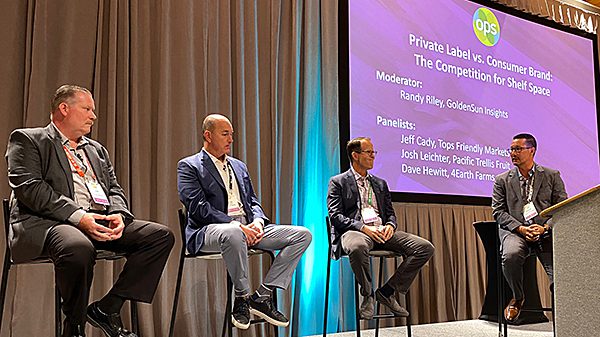MONTEREY, CA — Private labels account for about 18% of the overall market and are posting double digit growth, and consumer – and retailer – attitudes toward their presence on the shelves are changing.
Gone are the days where a private label serves as the lowest cost, with perceived lower quality.
Today, they serve multiple functions, depending on a retailer’s go-to-market strategy, said Jeff Cady, director of produce and floral for Tops Friendly Markets and Price Chopper/Market 32 BB #:103173.
“I think about what items do I think will resonate with a consumer in private label and what items are branded to resonate with a consumer, and where can I make that divide,” Cady said.
Tops is a very consumer brand-oriented retail chain in produce, Cady said, and sticks to private label in a more commodity setting.
“I think consumers want to see brands on the specialty-type things,” he said. He sees consumer brands as a point of differentiation from local competitors, which rely heavily on private labels in the produce department.
Cady joined a panel discussion at the Organic Produce Summit on July 14 led by Randy Riley of Golden Sun Insights, and formerly of Kroger Co., Dave Hewitt of 4Earth Farms, and Josh Leichter of Pacific Trellis BB #:164166.
For 4Earth Farms BB #:148899, which packs a number of retailer’s private labels, a consumer brand can help establish the product on the shelf, give a retailer an entry into a category, and the confidence to switch to its own brand, Hewitt said.
This can be an especially onerous transition for organics, which didn’t always have consistent enough supply for a retailer go all-in on private label.
“They just weren’t there yet, on their organic journey. We had our label (4Earth Farms) that could help them get into that mix,” he said. “And now today, we’re crop planning and packing in their label and the numbers are significant. We’d like our label, but it’s what you guys think is best for your market.”
Leichter said he’s seeing more retailers turn to private labels as a way to promote quality, rather than extreme value.
“I think we’re going to continue to see that shift,” he said. “That’s a way for retailers to differentiate, a way to compete on something that has been promised.”
The Organic Produce Network plans to offer replays of educational sessions here.



